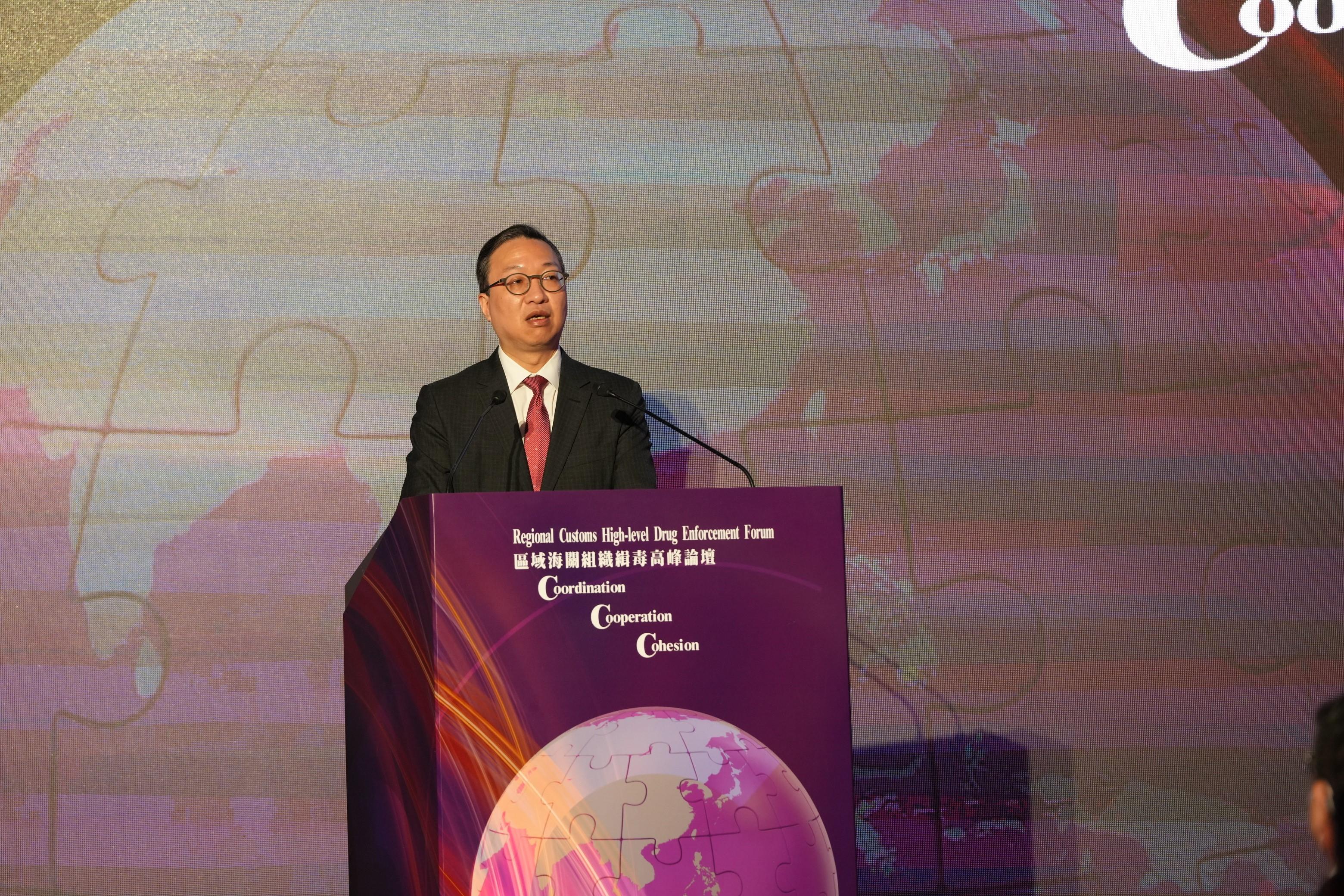Following is the speech by the Secretary for Justice, Mr Paul Lam, SC, at the Regional Customs High-level Drug Enforcement Forum today (February 16):
Mr Wang (Vice-minister of the General Administration of Customs, Mr Wang Lingjun), distinguished guests, ladies and gentlemen,
Good morning. I am delighted to join you all at this Regional Customs High-level Drug Enforcement Forum today.
This is the very first time for our Customs and Excise Department of the Hong Kong Special Administrative Region (HKSAR) to host such a high-level forum. This Forum indeed testifies that Hong Kong is back to the centre stage after three challenging years caused by the COVID-19 pandemic. It is also an opportune time for authorities in the region to gather and discuss, in person, the latest drug-related issues, promote multi-agency co-operation, and enhance international intelligence exchange. I wish to extend a very warm welcome to our friends from different parts of the world to be here with us to share the common goal of combating transnational drug activities.
While travelling in the past few years has been substantially hampered by border closures and travel restrictions, the drug problem knows no boundaries. Its transnational nature certainly requires different jurisdictions to co-operate and co-ordinate closely on a wide range of issues.
Multipronged anti-drug strategy
To effectively address drug issues, the HKSAR Government has all along been adopting a multipronged anti-drug strategy, and taking active steps on various fronts. Externally, we have established extensive networks with our counterparts, including many of you, as well as actively participating in international and regional drug forums, with a view to keeping abreast of the latest world drug scene. Locally, our Government spares no effort to tackle the problem through (1) preventive education and publicity, (2) treatment and rehabilitation services, (3) policy researches and (4) legislation and law enforcement.
Legislation and law enforcement
As the Secretary for Justice of the HKSAR Government, let me focus on the last point – legislation and law enforcement, which is what my colleagues in the Department of Justice play a vital role.
To keep Hong Kong's anti-drug work in line with the latest international standards, the HKSAR Government updates our relevant local legislations from time to time to include new emerging substances under statutory control. The key considerations are, of course, to keep abreast of the global drug trends, as well as to achieve the overarching goal of protecting public health.
A recent example is the new legislative control of clonazolam in Hong Kong, which came into effect in December 2022. Clonazolam is now under the same strict control as other dangerous drugs under the Dangerous Drugs Ordinance, Chapter 134 of the Hong Kong Law, meaning that trafficking (including importing and exporting) and illicit manufacturing of clonazolam is prohibited.
As to law enforcement, the Department of Justice provides professional legal advice and conducts criminal prosecutions, with a view to assisting law enforcement agencies to handle cases expeditiously and effectively.
I must highlight that it is never a prosecutor's duty to obtain a conviction by all means. The role of the prosecutor is to act in an impartial manner, as a "minister of justice", by fairly and objectively assisting the Court to ascertain the truth and to do justice between the community and the accused according to law and evidence. Convictions of drug offenders and the punishments imposed on them serve as an effective deterrence to potential drug offenders and the general public.
Mutual legal assistance
We will not have a chance to win this formidable war against drugs on our own. The HKSAR is committed to co-operating with foreign jurisdictions in combating crimes, including drug-related offences. Under the Mutual Legal Assistance in Criminal Matters Ordinance, Chapter 525 of the Hong Kong Law, law enforcement authorities in the HKSAR are able to provide assistance to authorities abroad who are investigating or prosecuting criminal offences overseas.
The HKSAR has signed bilateral mutual legal assistance agreements with a number of foreign jurisdictions, 21 of which are currently in force. Many of you are representing those jurisdictions, including Belgium, Denmark, Indonesia, India, Israel, Italy, Japan, Korea, Malaysia, the Philippines, Poland and Sweden.
In addition to bilateral agreements, the multilateral treaty of the United Nations Convention Against Illicit Traffic in Narcotic Drugs and Psychotropic Substances 1988, which contains provision for mutual legal assistance between the parties to the Convention, also applies to the HKSAR.
Our local legislations, together with those international conventions and bilateral agreements, collectively form a sound legal basis of the HKSAR for joint international efforts to bring drug offenders to justice and to confiscate the proceeds of their crimes.
Closing
Ladies and gentlemen, you would certainly agree that young people are our future. As remarked by President Xi Jinping on July 1 last year in Hong Kong, "Hong Kong will prosper only when its young people thrive." To create a better future for our next generation, we must tackle the drug problem and develop a drug-free community. To this end, we look forward to forging closer ties with every one of you, which should be a win-win strategy to all of us. That is why we cherish very much the opportunity today for exchanging views and sharing drug enforcement experiences.
Lastly, I wish to thank the Customs and Excise Department for organising this dynamic and rewarding event. I wish you all a very fruitful and insightful Forum today, and a very pleasant stay in Hong Kong. Thank you very much.
Follow this news feed: East Asia






